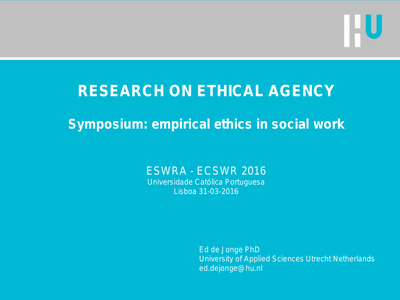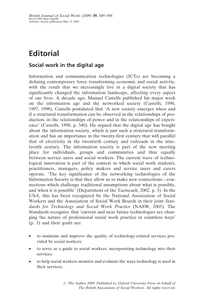Symposium ESWRA - ECSWR 2016: empirical ethics in social work. Objective: ethical aspects of social work (esp. at home) Structure: cooperation of the research group of UAS Utrecht Netherlands with six regional welfare organizations Method: practice based ethics research Focus on professional practice: learning from moral experiences in frontline practice (cf. Van Doorn, 2008) Hybrid approach: combining theoretical resources and professional practice (cf. Banks & Gallagher, 2009) Mixed methods: desk research, interviews, best practice units (BPU), development of ethical tools
DOCUMENT

Inleiding op een themanummer van British Journal of Social Work over sociaal werk in de digitale samenleving.
DOCUMENT

Background The global nursing shortages exacerbated by the COVID-19 pandemic necessitated a drastic reorganization in nursing practices. Work routines, the composition of teams and subsequently mundane nursing practices were all altered to sustain the accessibility and quality of care. These dramatic changes demanded a reshaping of the nurses’ work environment. The aim of this study was to explore how nurses reshaped their work environment in the early stages of the COVID-19 pandemic. Methods A descriptive study comprising 26 semi-structured interviews conducted in a large Dutch teaching hospital between June and September 2020. Participants were nurses (including intensive care unit nurses), outpatient clinic assistants, nurse managers, and management (including one member of the Nurse Practice Council). The interviews were analysed with open, axial, and selective coding. Results We identified five themes: 1) the Nursing Staff Deployment Plan created new micro-teams with complementary roles to meet the care needs of COVID-19 infected patients; 2) nurse-led adaptations effectively managed the increased workload, thereby ensuring the quality of care; 3) continuous professional development ensured adequate competence levels for all roles; 4) interprofessional collaboration resulted in experienced solidarity, a positive atmosphere, and increased autonomy for nurses; and, 5) supportive managers reduced nurses’ stress and improved work conditions. Conclusions This study showed that nurses positively reshaped their work environment during the COVID-19 pandemic. They contributed to innovative solutions in an environment of equal interprofessional collaboration, which led to greater respect for their knowledge and competencies, enhanced their autonomy and improved management support.
LINK
The focus of this project is on improving the resilience of hospitality Small and Medium Enterprises (SMEs) by enabling them to take advantage of digitalization tools and data analytics in particular. Hospitality SMEs play an important role in their local community but are vulnerable to shifts in demand. Due to a lack of resources (time, finance, and sometimes knowledge), they do not have sufficient access to data analytics tools that are typically available to larger organizations. The purpose of this project is therefore to develop a prototype infrastructure or ecosystem showcasing how Dutch hospitality SMEs can develop their data analytic capability in such a way that they increase their resilience to shifts in demand. The one year exploration period will be used to assess the feasibility of such an infrastructure and will address technological aspects (e.g. kind of technological platform), process aspects (e.g. prerequisites for collaboration such as confidentiality and safety of data), knowledge aspects (e.g. what knowledge of data analytics do SMEs need and through what medium), and organizational aspects (what kind of cooperation form is necessary and how should it be financed).Societal issueIn the Netherlands, hospitality SMEs such as hotels play an important role in local communities, providing employment opportunities, supporting financially or otherwise local social activities and sports teams (Panteia, 2023). Nevertheless, due to their high fixed cost / low variable business model, hospitality SMEs are vulnerable to shifts in consumer demand (Kokkinou, Mitas, et al., 2023; Koninklijke Horeca Nederland, 2023). This risk could be partially mitigated by using data analytics, to gain visibility over demand, and make data-driven decisions regarding allocation of marketing resources, pricing, procurement, etc…. However, this requires investments in technology, processes, and training that are oftentimes (financially) inaccessible to these small SMEs.Benefit for societyThe proposed study touches upon several key enabling technologies First, key enabling technology participation and co-creation lies at the center of this proposal. The premise is that regional hospitality SMEs can achieve more by combining their knowledge and resources. The proposed project therefore aims to give diverse stakeholders the means and opportunity to collaborate, learn from each other, and work together on a prototype collaboration. The proposed study thereby also contributes to developing knowledge with and for entrepreneurs and to digitalization of the tourism and hospitality sector.Collaborative partnersHZ University of Applied Sciences, Hotel Hulst, Hotel/Restaurant de Belgische Loodsensociëteit, Hotel Zilt, DM Hotels, Hotel Charley's, Juyo Analytics, Impuls Zeeland.
The transition towards an economy of wellbeing is complex, systemic, dynamic and uncertain. Individuals and organizations struggle to connect with and embrace their changing context. They need to create a mindset for the emergence of a culture of economic well-being. This requires a paradigm shift in the way reality is constructed. This emergence begins with the mindset of each individual, starting bottom-up. A mindset of economic well-being is built using agency, freedom, and responsibility to understand personal values, the multi-identity self, the mental models, and the individual context. A culture is created by waving individual mindsets together and allowing shared values, and new stories for their joint context to emerge. It is from this place of connection with the self and the other, that individuals' intrinsic motivation to act is found to engage in the transitions towards an economy of well-being. This project explores this theoretical framework further. Businesses play a key role in the transition toward an economy of well-being; they are instrumental in generating multiple types of value and redefining growth. They are key in the creation of the resilient world needed to respond to the complex and uncertain of our era. Varta-Valorisatielab, De-Kleine-Aarde, and Het Groene Brein are frontrunner organizations that understand their impact and influence. They are making bold strategic choices to lead their organizations towards an economy of well-being. Unfortunately, they often experience resistance from stakeholders. To address this resistance, the consortium in the proposal seeks to answer the research question: How can individuals who connect with their multi-identity-self, (via personal values, mental models, and personal context) develop a mindset of well-being that enables them to better connect with their stakeholders (the other) and together address the transitional needs of their collective context for the emergence of a culture of the economy of wellbeing?
ALE organised an event with Parktheater Eindhoven and LSA-citizens (the Dutch umbrella organisation for active citizens). Five ALE students from the minor Imagineering and business/social innovation took responsibility for concept and actual organisation. On Jan 18th, they were supported by six other group members of the minor as volunteers. An IMEM-team of 5 students gathered materials for a video that can support the follow-up actions of the organisers. The students planned to deliver their final product on February 9th. The theatre will critically assess the result and compare it to the products often realised by students from different schools or even professional ones, like Veldkamp productions. Time will tell whether future opportunities will come up for IMEM. The collaboration of ALE and IMEM students is possible and adding value to the project.More than 180 visitors showed interest in the efforts of 30 national and local citizen initiatives presenting themselves on the market square in the theatre and the diverse speakers during the plenary session. The students created a great atmosphere using the qualities of the physical space and the hospitality of the theatre. Chair of the day, Roland Kleve, kicked off and invited a diverse group of people to the stage: Giel Pastoor, director of the theatre, used the opportunity to share his thoughts on the shifting role of theatre in our dynamic society. Petra Ligtenberg, senior project manager SDG NL https://www.sdgnederland.nl/sdgs/ gave insights to the objectives and progress of the Netherlands. Elly Rijnierse, city maker and entrepreneur from Den Haag, presented her intriguing efforts in her own neighbourhood in the city to create at once both practical and social impacts on SDG 11 (sustainable city; subgoal 3.2). Then the alderman Marcel Oosterveer informed the visitors about Eindhoven’s efforts on SDGs. The plenary ended with very personal interviews of representatives of two impressive citizen initiatives (Parkinson to beat; Stichting Ik Wil). In the two workshop rounds, ALE took responsibility for two workshops. Firstly the workshop: Beyond SDG cherrypicking: using the Economy for the common good’, in cooperation with citizen initiative Ware winst Brabant en Parktheater (including Social innovation-intern Jasper Box), secondly a panel dialogue on local partnerships (SDG 17) for the sustainable city (SDG 11) addressing inclusion (SDG 10) and the livability (SDG 3) with 11 representatives from local/provincial government, companies, third sector and, of course: citizen initiatives.
Lectoraat, onderdeel van NHL Stenden Hogeschool